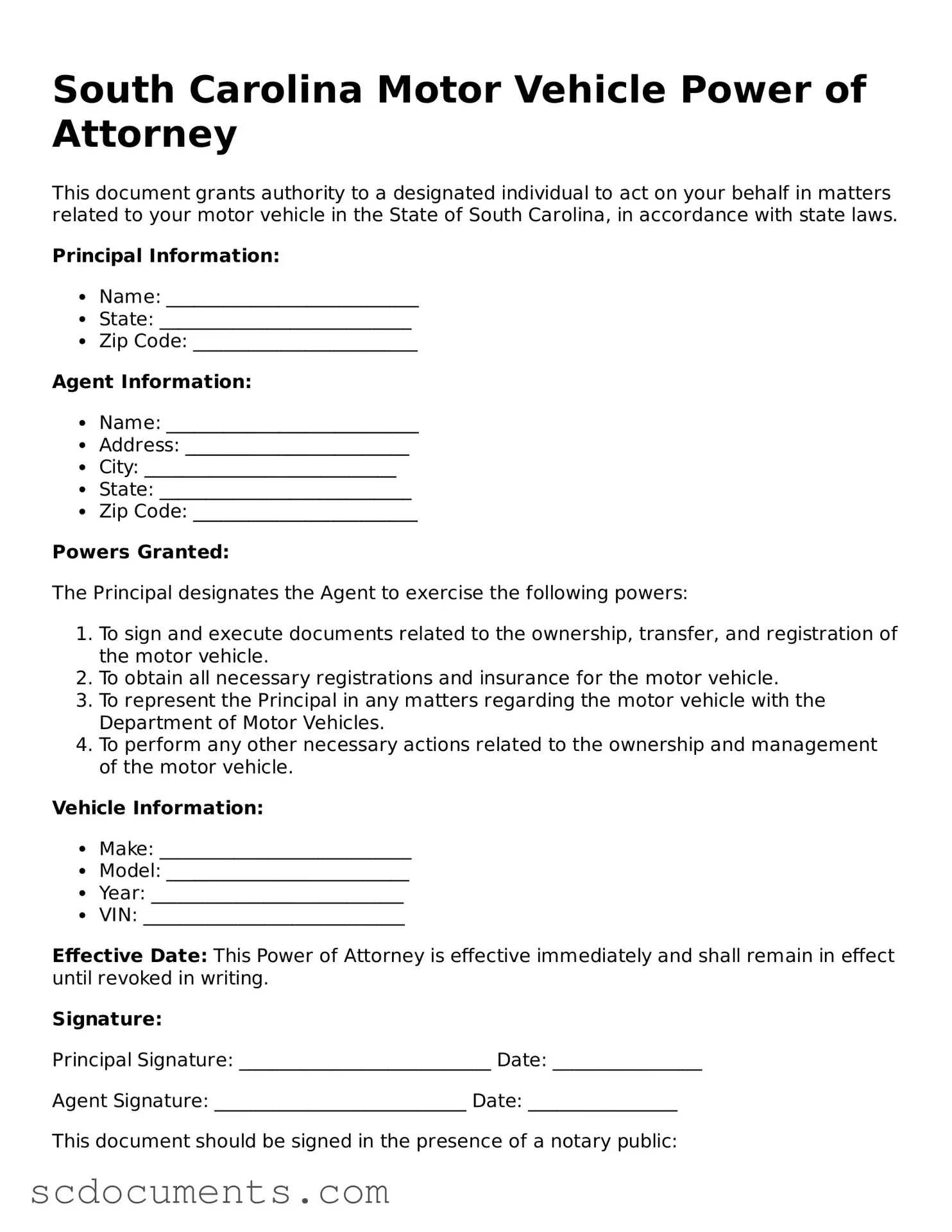Legal South Carolina Motor Vehicle Power of Attorney Form
Dos and Don'ts
When filling out the South Carolina Motor Vehicle Power of Attorney form, it’s essential to follow specific guidelines to ensure the process goes smoothly. Here are some important do's and don'ts to keep in mind:
- Do ensure that you are using the most current version of the form.
- Do provide accurate and complete information about both the principal and the agent.
- Do sign the form in the presence of a notary public if required.
- Do keep a copy of the completed form for your records.
- Don't leave any blank spaces on the form; if a section does not apply, write "N/A."
- Don't forget to specify the powers you are granting to your agent clearly.
File Data
| Fact Name | Description |
|---|---|
| Purpose | The South Carolina Motor Vehicle Power of Attorney form allows an individual to designate another person to handle motor vehicle transactions on their behalf. |
| Governing Law | This form is governed by South Carolina Code of Laws, Title 56, Chapter 19. |
| Principal | The individual granting authority is referred to as the principal. |
| Agent | The person designated to act on behalf of the principal is called the agent. |
| Scope of Authority | The agent can perform tasks such as signing title transfers, registering vehicles, and obtaining license plates. |
| Durability | This power of attorney can be durable, meaning it remains effective even if the principal becomes incapacitated. |
| Revocation | The principal can revoke the power of attorney at any time, provided they notify the agent and relevant parties. |
| Notarization | The form typically requires notarization to be valid and recognized by the South Carolina Department of Motor Vehicles. |
| Usage | This form is commonly used for vehicle sales, purchases, and other related transactions when the principal cannot be present. |
Documents used along the form
When dealing with motor vehicle transactions in South Carolina, it’s often necessary to use various forms and documents alongside the Motor Vehicle Power of Attorney. These documents help ensure that the process runs smoothly and legally. Below is a list of commonly used forms that may accompany the Power of Attorney.
- South Carolina Vehicle Title Application: This document is essential for applying for a new title when ownership of a vehicle changes. It includes details about the vehicle and the new owner.
- Bill of Sale: A Bill of Sale serves as a receipt that outlines the sale of a vehicle. It includes information about the buyer, seller, and the vehicle itself, confirming the transaction.
- Odometer Disclosure Statement: This statement is required to document the mileage on a vehicle at the time of sale. It helps prevent fraud and ensures accurate reporting of a vehicle's history.
- Employee Handbook Template: For employers looking to streamline their policies, our valuable Employee Handbook resource provides a structured approach to creating a clear and informative handbook.
- Application for a Duplicate Title: If the original vehicle title is lost or damaged, this application is necessary to request a replacement. It helps maintain proper ownership records.
- Power of Attorney for Vehicle Registration: Similar to the Motor Vehicle Power of Attorney, this document specifically authorizes someone to handle vehicle registration tasks on your behalf.
- South Carolina DMV Forms: Various forms may be required for specific transactions, such as registration renewals or changes to vehicle status. These forms vary based on the specific needs of the transaction.
- Insurance Verification Form: This document confirms that the vehicle is insured. It may be required for registration and ensures compliance with state laws regarding vehicle insurance.
Having these documents ready can streamline the process of transferring vehicle ownership or handling related matters. Each document serves a specific purpose and contributes to a smooth transaction. It’s important to gather all necessary forms to avoid delays and ensure compliance with South Carolina laws.
Key takeaways
The South Carolina Motor Vehicle Power of Attorney form is an important document that allows individuals to designate someone else to act on their behalf regarding motor vehicle transactions. Here are key takeaways to consider when filling out and using this form:
- Eligibility: The individual granting power of attorney must be at least 18 years old and have the legal capacity to enter into contracts.
- Specific Authority: The form should clearly specify the powers being granted, such as the ability to transfer title, register a vehicle, or obtain a license plate.
- Signature Requirements: The principal must sign the form in the presence of a notary public to ensure its validity.
- Revocation: The principal retains the right to revoke the power of attorney at any time, provided that they do so in writing.
- Record Keeping: It is advisable to keep a copy of the completed form for personal records and provide a copy to the agent designated in the document.
Understanding these key points can facilitate smoother transactions and ensure that the power of attorney is executed properly in South Carolina.
Other South Carolina Templates
South Carolina Vehicle Bill of Sale - The form provides a space to indicate the sale price and payment method used in the transaction.
If you are dealing with the Missouri 5177 form for correcting your vehicle's title, it's important to have access to the right resources to facilitate this process. You can find all the necessary documentation and guidelines to assist you in completing the Title Assignment Correction Form effectively by visiting All Missouri Forms, where you'll find comprehensive support tailored to your needs.
Scdmv Bill of Sale - May include disclosures about any known issues with the vehicle.
